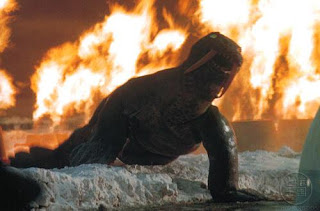Originally published on Set The Tape
The 1960s were a big decade for Japanese film. The big budget disaster movies were doing well, and giant monsters were becoming more and more popular, as the Godzilla franchise began to hit its stride and new creatures emerged onto screens. Toho was at the heart of this boom, producing some of the biggest films of the decade, and as such wanted to continue to ride this wave of success with new, creative endeavours. 1962’s Gorath was an attempt to make a big budget science fiction film that would stun audiences and showcase some of the best special effects work around; and for the most part, it did just that.
Directed by Ishiro Honda, the acclaimed filmmaker behind such hits as Godzilla, Rodan, and Mothra, the film begins with the crew of the JX-1 Hawk, a new exploratory space vessel, competing its months long mission on the outskirts of the solar system. With the crew preparing to return home, they receive a message from Earth asking them to investigate a strange gravitational anomaly near Saturn. Upon going to investigate, the crew are shocked to discover that a rogue star has entered the solar system, and is making its way towards Earth. The star is putting out immense gravitational forces, and it destroys the JX-1.
Back on Earth, scientists gather to discuss the information the lost crew were able to send back, and work out that in two years time the rogue star, named Gorath, will pass close enough to Earth to tear the planet apart. A plan is devised, and the world’s governments come together in Antarctica to create a giant engine that they will be able to use to push Earth out of Gorath’s path, moving the planet back to its regular orbit once the danger has passed. When Gorath reaches Earth, having already stripped Saturn of its rings and grown in mass, the engines fire and move the planet out of the way; unfortunately, the intense gravity does cause huge damage, creating giant floods and huge earthquakes across the planet, including one that completely destroys Tokyo. Fortunately, the plan succeeds, and the Earth is saved.
Hot off the success of 1960’s big budget disaster movie The Final War, which saw the Earth completely destroyed, Toho wanted to create another big budget disaster movie, though one with a more hopeful ending. Feeling confident that the film would do well following the success of their previous films, Toho gave Gorath a bigger budget, and an almost year long production time to create the movie. And it really does show on screen. The miniature work on Gorath is wonderful, and rivals some of the best stuff seen at the time. The increase in budget and production time meant that Honda was able to take his time, to allow the special effects team to create more intricate, detailed models and sets.
One thing that perhaps harms Gorath, or at least interrupts the flow of the movie, is the inclusion of a giant walrus Kaiju named Maguma. Thanks to the success of Toho’s film Mothra, studio executives wanted to include a giant monster, believing that by marrying together The Final War and Mothra they would be able to capitalise on the success of both films. Whilst this might work on paper, in execution it really fails to be anything other than odd. Maguma appears towards the end of the film, when heat generated by the giant engines melts the surrounding ice in Antarctica and awakens the giant monster that was sleeping beneath the surface. With the creature threatening to destroy the engine, the only thing that can save the Earth, the military are forced to engage the monster and kill it.
These sequences add very little to the film, and were even cut in the American release of the movie with no real damage being done to the story. If anything the cuts actually helped to keep the plot focused on the rogue star, and to keep tensions high. It also doesn’t help that Maguma is possibly the cheapest looking thing in the film. It’s unclear whether the creature was a late stage addition, if Honda had less focus on the monster, or if it’s just down to the design, but the monster looks rubbery and fake in ways that you don’t come to expect from a Toho creation, and looks like a cheap imitation.
The odd inclusion of the giant walrus monster aside, Gorath proves to be a great movie. Its plot is interesting, especially in comparison to Toho’s The Final War, and acts like a good companion to that film, showcasing humanity coming together to create a hopeful future, rather than humanity destroying itself. The special effects look great, with some good wire-work being used to create zero gravity space scenes, and the miniature and model work is top notch. If you’re looking for a big budget Japanese Tokusatsu film that isn’t just big monsters, Gorath is one worth watching.



No comments:
Post a Comment